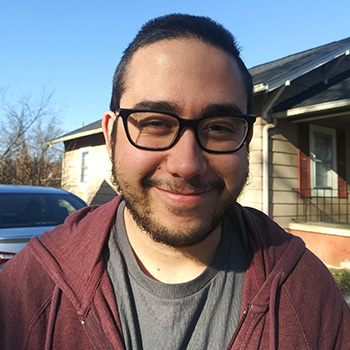
Brandon Colon
Field Applications Scientist, Leica
Brandon majored in chemistry and was a student in the first cohort of NIH-supported MARC Scholars at the University of West Florida. His research was published on the cover of the Journal of Physical Chemistry’s November 2020 issue. He completed his doctorate degree at the University of Tennessee, Knoxville and is now a field applications scientist for the microscopy Leica.
Your research was recently published in a highly regarded journal. Can you elaborate on the research and how it feels to have it published?
My research focuses on nonlinear microscopy, which is a technical way of saying that we study phenomena that happen on the ultrafast (really fast!) timescale and can spatially resolve such dynamics using a microscope platform. This field has contributed many advances with regards to the study of solar cell fabrication, drug/membrane dynamics and light harvesting complexes in plants. My recent contribution was in a perspective on the future prospects of this field, and my past paper described how these techniques can be applied to microreactors in order to make it possible to create high grade products at a fraction of the cost. I'm happy to have my work be published, as it is neat to know that I have contributed to the ongoing progress of technology that will help human society to grow.
You have a pretty triumphant story about your time at UWF and completing a STEM degree. Can you share your story?
My story is one that many people can relate to—when I first started I did not do well and dropped out after two years. I was on a different degree path back then, so I started working many different jobs: dishwasher, janitor, library assistant and assembly line worker. After I saved up some money, I was able to pay for my classes out of pocket and get my GPA high enough to regain my lost scholarships, including the Bright Futures Scholarship. I also received help from Dr. Karen Molek, who was able to point me toward the correct resources to improve my grades. After that I was able to apply for the MARCUSTAR scholarship, which paid for my undergraduate degree and provided living assistance that I definitely needed while I was raising my newborn. This scholarship also gave me research experience that got me on the track for graduate school, and hopefully by next semester, to obtain a doctorate in chemistry.
How did your time at UWF help you get where you are today?
UWF was integral to me even attempting to go for a doctorate thanks to the MARC scholarship, but beyond that I really have to give credit to the chemistry department and the professors. They really did well in preparing students for graduate school and for building a solid academic foundation that has served me well over the past four years.
What are your plans after completing your doctorate?
I hope to either become a laser or microscopy specialist working for companies like Nikon, Olympus, Spectraphysics or Coherent. I have always liked working with my hands, so being able to install and improve top-of-the-line microscopes/ lasers would be pretty awesome.


